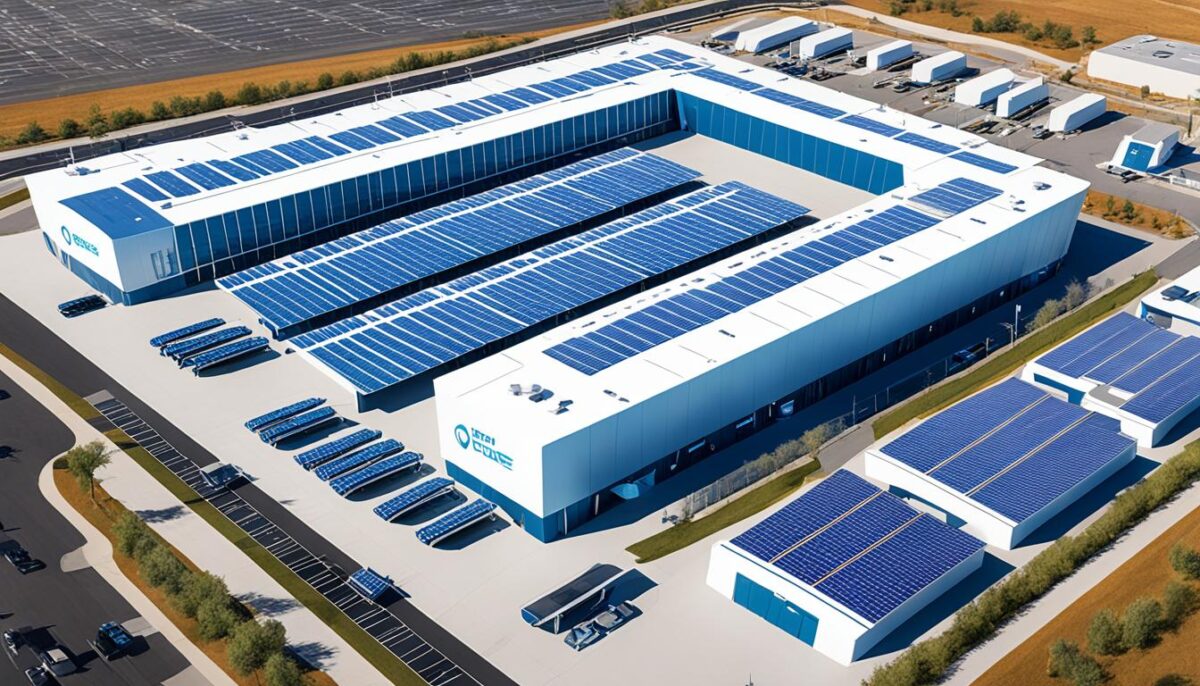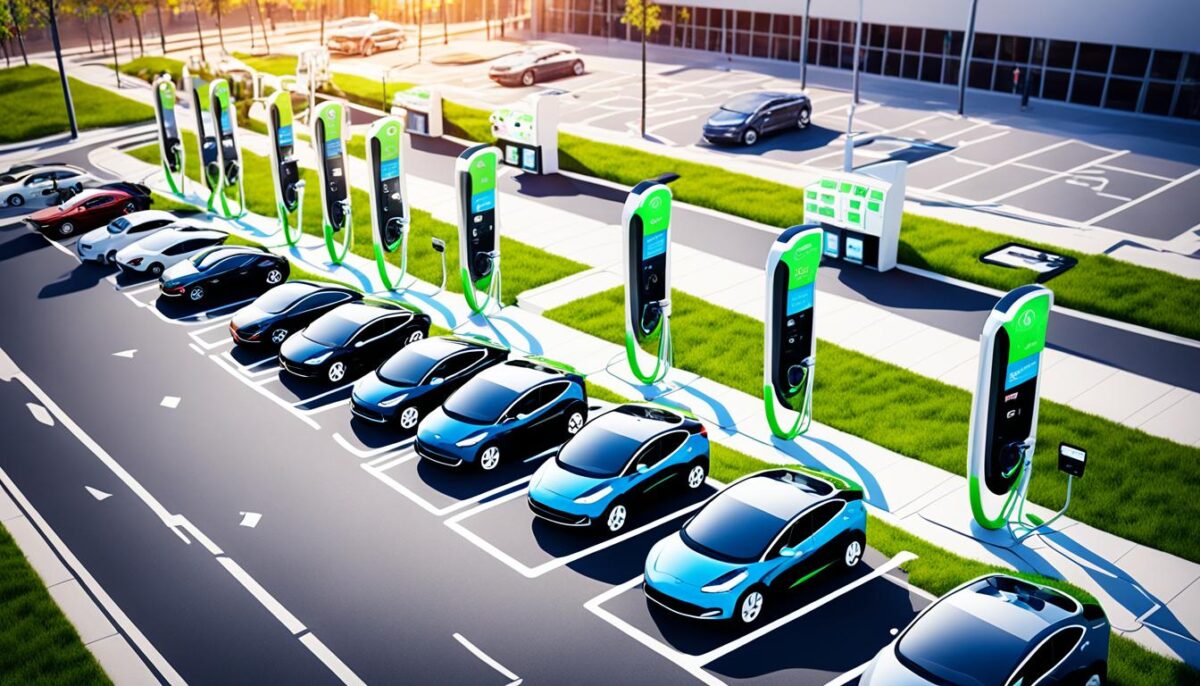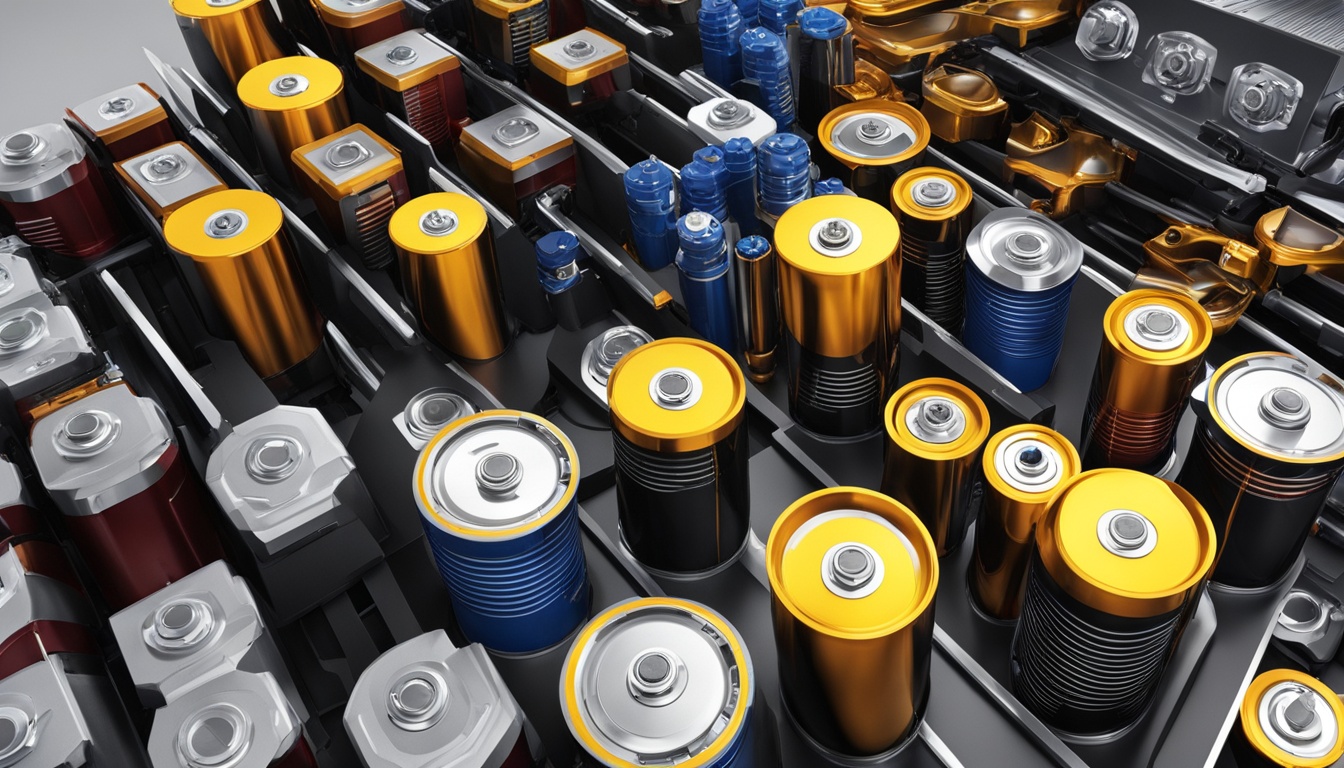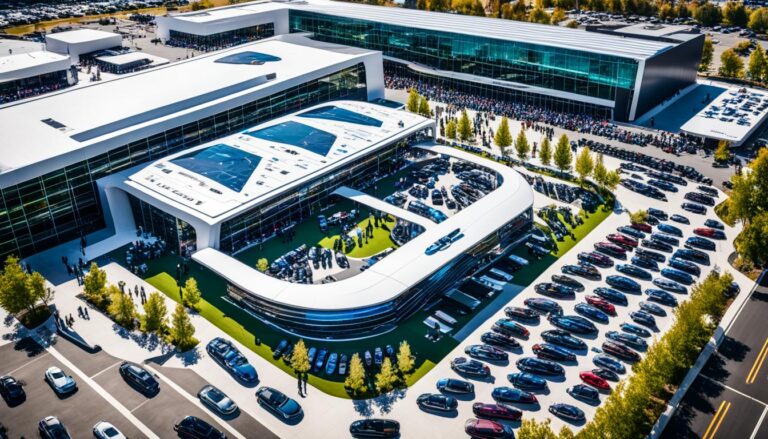Advanced Automotive Battery Conference
Welcome to the Advanced Automotive Battery Conference, the premier event that brings together industry experts, researchers, and thought leaders in the field of automotive battery technology and vehicle electrification. Our conference serves as a platform for sharing knowledge, exploring new trends, and addressing challenges in this rapidly advancing industry.
At the Advanced Automotive Battery Conference, we believe that the future of transportation lies in the evolution of automotive batteries. As the demand for electric vehicles continues to grow, it is crucial to stay informed about the latest advancements and innovations in automotive battery technology.
Our conference offers a unique opportunity to connect with like-minded professionals, engage in insightful discussions, and gain a comprehensive understanding of the industry’s current landscape. By attending, you will have access to groundbreaking research, cutting-edge technologies, and expert insights that can help shape the future of vehicle electrification.
Whether you are an industry veteran, a researcher, or an enthusiast, the Advanced Automotive Battery Conference provides a platform for collaboration, networking, and learning. Join us as we come together to push the boundaries of automotive battery technology and accelerate the transition to a sustainable and electrified future.
Exploring Emerging Battery Technologies
In this section, we delve into the emerging battery technologies that are revolutionizing the automotive industry. The advancements in lithium-ion batteries have significantly improved their energy storage capacity, making them a crucial component for electric vehicles. With their ability to store and deliver high amounts of power efficiently, lithium-ion batteries have propelled the growth of the electric vehicle market.
However, the industry is not stopping there. There is a growing interest in solid-state batteries as the next frontier in energy storage. These batteries offer several advantages over traditional lithium-ion batteries, including increased energy density, enhanced safety, and faster charging times. Solid-state batteries are considered one of the most promising emerging battery technologies due to their potential to address the limitations of current battery systems.
One key advantage of solid-state batteries is their ability to eliminate the use of liquid electrolytes, reducing the risk of leakage and enhancing overall safety. Additionally, solid-state batteries have the potential to offer greater energy storage capacity, which can enable longer driving ranges for electric vehicles. The incorporation of solid-state batteries in electric vehicles could ultimately lead to quicker charging times and improved efficiency.
Developing solid-state batteries presents both opportunities and challenges. While the advantages are promising, there are still obstacles to overcome. Issues such as high costs, limited manufacturing capabilities, and low durability need to be addressed for the widespread adoption of solid-state batteries in the automotive industry.
The ongoing research and development in emerging battery technologies, including both lithium-ion and solid-state batteries, are shaping the future of the automotive industry. These advancements hold the potential to bring about revolutionary changes in electric vehicle performance, charging infrastructure, and overall sustainability.
The Advancements in Lithium-ion Batteries
Lithium-ion batteries have been at the forefront of energy storage for electric vehicles due to their high energy density and long cycle life. These batteries employ lithium ions to facilitate the flow of electrons during charging and discharging processes. The continuous improvement in lithium-ion battery technology has led to increased energy storage capacity, improved efficiency, and increased overall vehicle range.
One of the major breakthroughs in lithium-ion battery technology is the development of NMC chemistries (nickel-manganese-cobalt), which have improved the energy density and thermal stability of the batteries. This has resulted in longer-lasting battery packs and improved safety during operation. Furthermore, the integration of advanced battery management systems has enhanced the overall performance and durability of lithium-ion batteries.
The Potential of Solid-State Batteries
Solid-state batteries are considered the next big leap in energy storage technology. These batteries utilize solid electrolytes instead of liquid electrolytes, eliminating the risk of leakage and improving overall safety. Solid-state batteries offer several advantages over traditional lithium-ion batteries, including:
- Higher energy density for increased driving range
- Improved safety due to the absence of flammable liquid electrolytes
- Faster charging times for added convenience
- Potential for lower manufacturing costs and environmental impact
However, the widespread adoption of solid-state batteries faces challenges that need to be overcome. Some of the key challenges include the need for scalable manufacturing processes, limited availability of solid-state electrolytes, and the development of robust electrode materials. Despite these challenges, the potential benefits of solid-state batteries make them a highly promising technology for the automotive industry.
| Lithium-ion Batteries | Solid-State Batteries |
|---|---|
| Utilize liquid electrolytes | Utilize solid electrolytes |
| High energy storage capacity | Higher energy density |
| Long cycle life | Improved safety due to non-flammable electrolytes |
| Established manufacturing processes | Manufacturing challenges due to limited scalability |

Enhancing Battery Performance and Durability
Battery performance and durability play a critical role in the success of electric vehicles. At our conference, we explore various strategies and technologies that aim to enhance battery performance and prolong battery life for a sustainable and efficient electric vehicle fleet.
One of the key factors that contribute to improved battery performance is the implementation of advanced Battery Management Systems (BMS). These systems are designed to optimize battery operation, monitor vital parameters, and ensure efficient charging and discharging processes. By leveraging sophisticated algorithms and real-time data, BMS can significantly enhance battery performance, extend its lifespan, and prevent issues such as overcharging and overheating.
In addition to Battery Management Systems, advancements in battery materials and designs have contributed to enhanced durability and mitigation of degradation and aging concerns. For instance, the integration of more robust and stable materials, such as silicon anodes in lithium-ion batteries, has shown great potential in improving energy storage capacity and enabling faster charging times.
Furthermore, the development of new battery chemistries, such as lithium-sulfur and lithium-air, holds promise for even higher energy densities and longer cycle life. These emerging technologies aim to address the limitations of traditional battery chemistries and pave the way for future advancements in electric vehicle battery performance.
Another crucial aspect of battery durability is effective thermal management. Proper cooling and heating systems, integrated within the battery pack, help maintain optimal operating temperatures and prevent the thermal degradation of battery cells. Effective thermal management ensures consistent battery performance, longer lifespan, and improved safety.
The Role of Battery Management Systems in Optimizing Performance
At our conference, experts explore the importance of Battery Management Systems (BMS) in optimizing battery performance and ensuring the overall efficiency of electric vehicles. BMS acts as the brain of the battery pack, continuously monitoring and controlling various parameters such as voltage, current, and temperature.
“Battery Management Systems play a crucial role in extending battery life and maximizing performance. They enable precise monitoring, state-of-charge estimation, and voltage balancing, ensuring the safe and efficient operation of electric vehicles.” – Dr. Sarah Brown, Battery Technology Expert
BMS performs a range of functions to enhance battery performance, including:
- Balancing the charge across individual battery cells, preventing overcharging or undercharging, which can lead to capacity loss.
- Providing accurate state-of-charge (SOC) estimation, allowing drivers to effectively plan their journeys and avoid unexpected range anxiety.
- Ongoing monitoring of battery parameters such as temperature and voltage, safeguarding against potential thermal runaway or over-discharge situations.
- Enabling efficient charging and discharging, optimizing energy consumption and extending battery life.
With the continuous advancements in Battery Management Systems and their integration into electric vehicle designs, we can expect to see even greater improvements in battery performance and durability. The collaboration between battery manufacturers, automotive companies, and research institutions is driving innovation in this field, paving the way for a sustainable and efficient future of electric transportation.
| Battery Performance Strategies | Battery Durability Enhancements |
|---|---|
|
|
Charging Infrastructure and Battery Safety
A robust charging infrastructure is essential for the widespread adoption of electric vehicles. At the Advanced Automotive Battery Conference, we recognize the significance of investing in charging infrastructure to address the needs and concerns of electric vehicle owners. In this section, we will explore the current state of charging infrastructure, discuss the challenges associated with charging networks, and highlight the efforts being made to establish a reliable and accessible charging infrastructure.
The Current State of Charging Infrastructure
As the demand for electric vehicles continues to rise, it is crucial to assess the current state of charging infrastructure. While significant progress has been made, there are still gaps in the availability and accessibility of charging stations. These gaps can pose challenges for electric vehicle owners, especially during long-distance journeys or in areas with limited charging infrastructure.
Challenges and Solutions
Establishing a comprehensive charging infrastructure network comes with its fair share of challenges. Some of the major obstacles include high installation costs, complex permitting processes, and the need for standardized charging technologies. To overcome these challenges, collaboration among industry stakeholders, policymakers, and infrastructure providers is critical. By working together, we can address these barriers and accelerate the deployment of charging stations.
Advancements in High-Power Charging
One of the key areas of development in charging infrastructure is high-power charging. High-power charging technologies aim to reduce charging times and improve convenience for electric vehicle owners. These advancements enable faster charging speeds, allowing electric vehicle owners to spend less time waiting for their vehicles to recharge. The Advanced Automotive Battery Conference is dedicated to exploring these technologies and their potential impact on the future of electric transportation.
| Charging Infrastructure | Battery Safety | High-Power Charging |
|---|---|---|
| Current state of charging infrastructure | Measures being taken to ensure safe battery operation | Advancements in high-power charging technologies |
| Challenges associated with charging networks | Reduction in charging times | |
| Efforts to establish a reliable and accessible charging infrastructure | Improved convenience for electric vehicle owners |

Future Outlook and Industry Collaboration
The future of automotive batteries holds immense promise. As technology continues to advance, we can expect groundbreaking developments in energy storage, battery chemistries, and transportation modes. These advancements will shape the future of electric vehicles and drive the progress of vehicle electrification.
Breakthroughs in Energy Storage
One of the most significant areas of research and development in the automotive battery industry is energy storage. With the increasing demand for longer range and faster charging, researchers and engineers are actively working on breakthrough technologies to improve battery performance and increase energy density. These advancements will pave the way for electric vehicles that can travel longer distances on a single charge and charge faster than ever before.
Development of New Battery Chemistries
To meet the evolving needs of the automotive industry, researchers are exploring new battery chemistries that offer improved performance, efficiency, and safety. Solid-state batteries, for example, show great potential with their higher energy density and reduced risk of thermal runaway. By leveraging these new battery chemistries, we can overcome existing limitations and accelerate the widespread adoption of electric vehicles.
The future of automotive batteries is bright, and the potential for transformative breakthroughs is immense.
Integration of Batteries into Novel Transportation Modes
As electric vehicles become more prevalent, batteries are being integrated into novel transportation modes beyond cars and trucks. From electric buses and delivery vans to electric aircraft and boats, the electrification of various transportation sectors is gaining momentum. This expansion presents exciting opportunities for the automotive battery industry, as it allows for the development of specialized battery systems tailored to the unique requirements of each transportation mode.
Industry Collaboration and Electrification Roadmap
Industry collaboration plays a crucial role in driving the progress of vehicle electrification. Key stakeholders, including automakers, battery manufacturers, charging infrastructure providers, and government agencies, are coming together to establish a comprehensive electrification roadmap. By collaborating on standards, research, and infrastructure development, these industry players are working towards creating a sustainable ecosystem that supports the widespread adoption of electric vehicles.
Conclusion
The Advanced Automotive Battery Conference is a premier event that brings together industry professionals and thought leaders to shape the future of automotive battery technology. At the conference, we have the unique opportunity to gather, exchange knowledge, and explore the latest developments in emerging technologies, battery performance, charging infrastructure, and industry collaboration.
By participating in this conference, we stay at the forefront of advancements in the field of vehicle electrification. We gain valuable insights into emerging battery technologies, such as lithium-ion batteries and solid-state batteries, and their implications for electric vehicles. Additionally, we learn about strategies to enhance battery performance, prolong battery life, and address concerns related to degradation and aging.
Furthermore, the conference highlights the importance of a robust charging infrastructure for the widespread adoption of electric vehicles. We discuss the challenges associated with charging networks and the measures being taken to establish a reliable and accessible infrastructure. Battery safety is also emphasized, with a focus on ensuring safe battery operation and advancements in high-power charging technologies for improved convenience.
In conclusion, the Advanced Automotive Battery Conference is an essential event for industry professionals who aim to make a difference in the future of automotive battery technology. It provides a platform for knowledge sharing and collaboration, enabling us to shape the industry and drive the progress of vehicle electrification. By attending this conference, we ensure that we are well-informed and equipped to stay ahead in the rapidly evolving automotive battery landscape.







